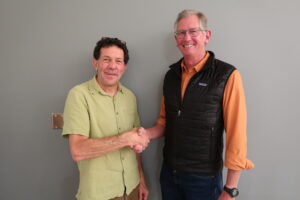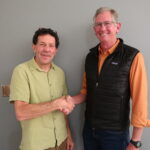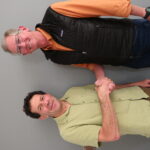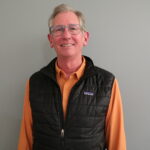Description
Tom Segerstrom (68) and Rick Gordon (63) sit down together for an in-person One Small Step conversation at the Teton County Library in Jackson, Wyoming.Subject Log / Time Code
Tom Segerstrom (T) and Rick Gordon (R) introduce themselves.
They ask each other why they chose to do the interview.
Read their bios. Tom asks Rick if he as an educator loves to learn. R talks about teenagers and their behaviors and unique needs.
R asks T about changing from Lutheran to Presbyterian.
R asks T about working in the government and how that effects his beliefs in fiscal responsibility.
R talks about his dissertation on government spending for his PhD in political science at University of Minnesota.
T talks about his work experience at the state and local government. #WY fish and game
Book: Good to Great. Can there be a great government? T says he was determined to make "great government."
T asks R about how/when he first formed his political beliefs. R says he grew up in Albany, NY with very involved parents. Mentions nationally the politics of the 60s not being quite as radical as the media makes it out to be.
T talks about "bio politics" as informing his politics because he is an environmentalist.
R asks T about how his family talked about the Vietnam War. T talks about how he discussed with his family the possibility of moving to Canada if he had been drafted.
R says protesting the Vietnam War was not the norm for people growing up in the 60s.
T talks about the role Christianity has had in his life.
R asks T about how his church asks for or solicits social action from the parish.
T asks R about how Judaism has influenced him.
R says teaching world religion to high schoolers in rural VT he learned the importance of morality and meaning for adolescent development.
Local issues of importance: to R its segregation between Latinos and Anglos. T asks R about kids self segregating in the schools.
Mexican quinceñeras bring music into people's lives.
T asks R how to break that distance down. R talks about one of his students' advice, "patience."
T mentions the Rotary Club as providing individual solutions rather than systemic changes. They give college scholarships to a handful of students.
R asks T what local issue is important to him. T talks about growth, commercialization. Calls it "colonization."
T talks about being a small business owner and seeing how his employees suffered for lack of housing, but he didn't have the resources.
T's wildlife safari business was meeting a need that National Park and Forest Service wasn't providing for visitors.
R compares employer provided housing to indentured servitude.
T asks R if he feels troubled by people who have the same beliefs as him. The words people use, like "Latinx" not being the battle to fight.
R brings up his mother's career working in family planning but Dobbs Decision brought people to talk about abortion in a personal way. The way liberals talk about rural America.
T talks about Republican Party tearing itself a part. Abortion "what's the most loving thing to do? the government doesn't know."
T talks about running for public office and knowing you can't demonize people.
R asks T, "when you think about the future f the country what are your concerns?"
T asks R, "what he will take away from the conversation." R talks about biking across America and seeing how kind people are. T says breaking down to the local level.
Participants
- Rick Gordon
- Tom Segerstrom






